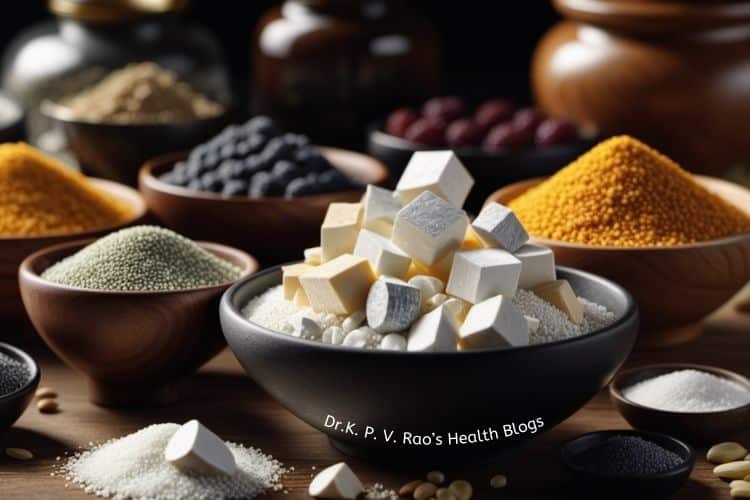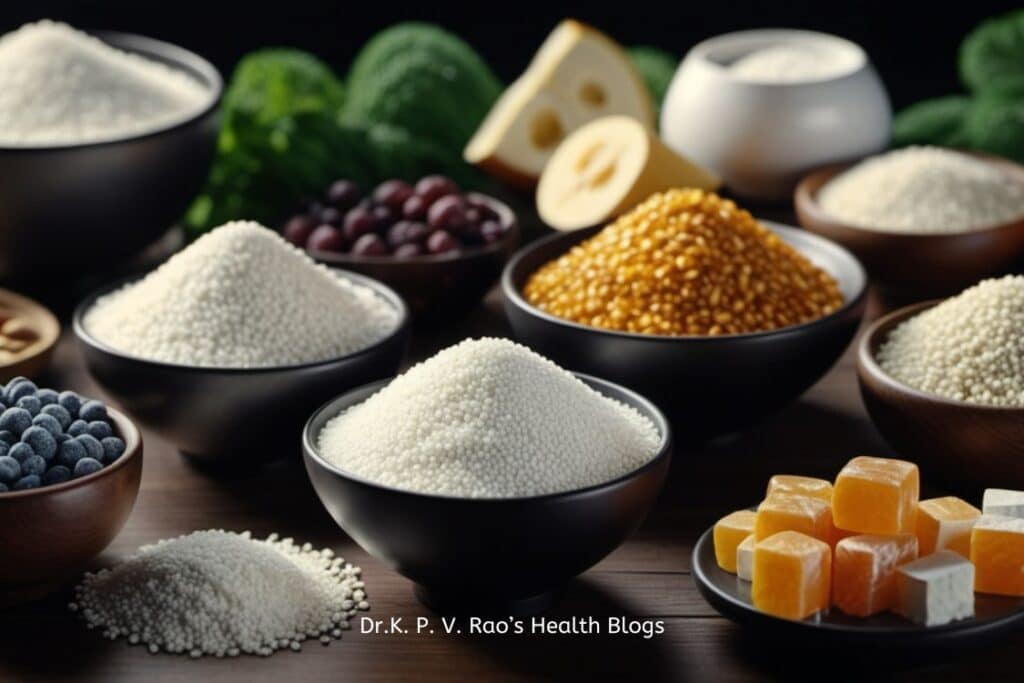Table of Contents
Sources of Essential Minerals in the Diet
In my previous article published on 5th December 2023, we had discussed a few Essential Minerals our body requires for our metabolic needs and proper growth. Here is a quick recap if you have read it already (or not)-
Now, in this article we will learn further regarding their sources, how much of each we require daily, signs and symptoms of their deficiency and supplements that are available [if you are not able to get it through food].
In this article, I have included one more essential mineral-Selenium-as a bonus.
Listen to this article
You can listen to this article as well read it while scrolling down:
To meet our body’s mineral requirements, it’s important to include a variety of mineral-rich foods in our diet. Here are some excellent sources of essential minerals:
- Calcium: Dairy products like milk, cheese, and yogurt are excellent sources of calcium. Other sources include leafy green vegetables, tofu, almonds, and fortified plant-based milk.
- Magnesium: Magnesium-rich foods include nuts and seeds, legumes, whole grains, dark chocolate, leafy green vegetables, and avocados.
- Iron: Iron can be found in both animal and plant-based foods. Good sources of iron include lean meats, poultry, fish, beans, lentils, spinach, and fortified cereals.
- Zinc: Zinc can be obtained from animal-based foods like meat, shellfish, and eggs. Plant-based sources include legumes, nuts, seeds, and whole grains.
- Chromium: Good sources of chromium include broccoli, whole grains, green beans, nuts, and brewer’s yeast.
- Iodine: Iodine is an essential mineral that is required for the production of thyroid hormones in the body.
- Foods that are rich in iodine include seafood, dairy products, and seaweed. Some examples of iodine-rich foods are oysters, snapper fish, tinned salmon, tuna, shrimp, eggs, milk, cheese, yogurt, and kelp.
- Other foods that contain some iodine include green beans, peas, corn, leafy greens, onions, sweet potatoes, legumes, nuts, seeds, and barley. Table salt is also iodized, which means it has added iodine.
- Refer to this article for more details- Iodine
Incorporating a variety of these foods into our diet can help ensure we’re getting an adequate intake of essential minerals. It’s important to note that the bioavailability of minerals can vary depending on the food source and other factors. For example, the calcium in dairy products is generally more easily absorbed than the calcium in plant-based foods.

Recommended Daily Intake of Essential Minerals
The recommended daily intake of essential minerals varies depending on factors such as age, gender, and overall health. Here are the approximate daily intake recommendations for some essential minerals:
- Calcium: The recommended daily intake of calcium for adults is around 1000-1200 milligrams per day. However, this can vary depending on age and gender. For example, women over 50 and men over 70 require slightly higher intake.
- Magnesium: The recommended daily intake of magnesium for adults is around 310-420 milligrams for women and 400-420 milligrams for men.
- Iron: The recommended daily intake of iron for adults is around 8-18 milligrams, depending on age and gender. Women of reproductive age require higher intake due to menstrual blood loss.
- Zinc: The recommended daily intake of zinc for adults is around 8-11 milligrams for women and 11-14 milligrams for men.
- Chromium: The recommended daily intake of chromium for adults is around 20-35 micrograms for women and 30-45 micrograms for men.
- Selenium: The recommended daily intake is 55 to 70 mcg. However, I recommend 100 mcg to patients having hypothyroidism. You can refer to the table below for a summary of RDA and the importance of the8se minerals for our bodily functions.
- Iodine: The RDA for iodine is 150mcg for adults aged 31 to 70 years and above. It differs in infants, children and breastfeeding mothers. You can refer to this article for a detailed study- RDA of Iodine.
The bioavailability of these essential minerals differs depending on their compounds or forms. You can refer to this table below for a quick review:
| Mineral | Recommended Daily Intake | Importance |
|---|---|---|
| Calcium (Available as Calcium citrate, calcium carbonate, calcium orates) | 1,000-1,300 mg | Essential for strong bones and teeth, muscle function, nerve transmission, and blood clotting. |
| Iron (Available as Ferrous sulphate, citrate or fumarate) | 8-18 mg | Vital for the production of hemoglobin, which carries oxygen in the blood, and energy metabolism. |
| Zinc (available as zinc sulphate) | 8-11 mg | Supports immune function, wound healing, DNA synthesis, and cell division. |
| Chromium (available as chromium picolinate or chromium sulphate) | 20-35 mcg | It helps regulate blood sugar levels and enhances the action of insulin in the body. |
| Magnesium (available as magnesium oxide, citrate, chloride or glycinate) | 310-420 mg | Involved in hundreds of biochemical reactions, including energy production, muscle function, and DNA synthesis. |
| Selenium Iodine | 55-70 mcg 150 mcg | Acts as an antioxidant, supporting the immune system and thyroid function. Iodine is an essential mineral that is required for the production of thyroid hormones in the body. |
It’s important to note that these are general recommendations and individual needs may vary. Pregnant women, athletes, and individuals with certain medical conditions may require higher intakes of certain minerals.
Consulting with a healthcare professional or registered dietitian can help determine the specific mineral needs for each individual.
Signs of Mineral Deficiencies and How to Address Them
Mineral deficiencies can lead to a wide range of health issues. Here are some common signs of mineral deficiencies and how to address them:
- Calcium Deficiency: Signs of calcium deficiency may include weakened bones, frequent fractures, muscle cramps, and dental problems. To address calcium deficiency, it’s important to consume calcium-rich foods or consider calcium supplements under the guidance of a healthcare professional.
- Magnesium Deficiency: Symptoms of magnesium deficiency may include muscle weakness, fatigue, irritability, and irregular heartbeat. Consuming magnesium-rich foods or taking magnesium supplements may help address this deficiency.
- Iron Deficiency: Iron deficiency can lead to fatigue, weakness, pale skin, and impaired cognitive function. Consuming iron-rich foods, such as lean meats, legumes, and fortified cereals, can help address this deficiency. In some cases, iron supplements may be necessary, but it’s important to consult with a healthcare professional before taking any supplements.
- Zinc Deficiency: Signs of zinc deficiency may include weakened immune function, delayed wound healing, hair loss, and taste abnormalities. Consuming zinc-rich foods or considering zinc supplements may help address this deficiency, but it’s important to consult with a healthcare professional before starting any supplementation.
- Chromium Deficiency: Chromium deficiency is relatively rare, but it can result in impaired glucose tolerance and an increased risk of type 2 diabetes. Consuming chromium-rich foods or considering chromium supplements may be beneficial, especially for individuals with diabetes or insulin resistance. However, it’s important to consult with a healthcare professional before starting any supplementation
- Selenium Deficiency: Selenium deficiency can have various effects on the body. Personally, I have experienced fatigue, weakened immune system, and impaired thyroid function due to insufficient selenium levels. It is essential to ensure an adequate intake of selenium through diet or supplements to prevent these negative consequences.
- Iodine deficiency: Iodine deficiency can present as goitre in the front of neck that can lead to hypo– or hyperthyroidism.
Addressing mineral deficiencies through dietary changes or supplementation can help improve overall health and prevent the associated health issues.
However, it’s important to note that excessive intakes of certain minerals can also be harmful. It’s always best to consult with a healthcare professional to determine the appropriate intake and address any deficiencies.
Supplements and Mineral Absorption
While it’s ideal to obtain essential minerals from a balanced diet, there may be instances where supplements can be beneficial.
Supplements can help bridge the gap when it’s challenging to meet the recommended daily intake through food alone or when specific health conditions require higher mineral levels.
When considering supplements, it’s important to choose high-quality products from reputable brands. Look for supplements that have undergone third-party testing to ensure their safety and efficacy. Additionally, be mindful of dosage recommendations and consult with a healthcare professional before starting any new supplements.
It’s also worth noting that certain factors can affect mineral absorption from supplements. For example, some minerals are better absorbed when taken with food, while others are more effectively absorbed on an empty stomach. Additionally, certain medications or medical conditions can interfere with mineral absorption. Consulting with a healthcare professional can help ensure proper supplement usage and absorption.
Supplements should never replace a balanced diet, but they can be a useful tool to support overall health and address specific mineral deficiencies. It’s always best to prioritize obtaining essential minerals through whole foods whenever possible.
Conclusion: Prioritizing Essential Minerals for a Healthy Body
Essential minerals are the unsung heroes that support our overall health and well-being. From calcium to magnesium, zinc to iron, these minerals play a vital role in various bodily functions and provide numerous metabolism benefits. They contribute to bone health, muscle function, energy metabolism, immune function, and heart health.
By understanding the functions and metabolism benefits of essential minerals, we can make informed choices about our diet and ensure we’re fueling our bodies with the nutrients they need.
Incorporating a variety of mineral-rich foods into our diet, meeting the recommended daily intake, and addressing any deficiencies can help us maintain optimal health.
Remember, a healthy body is a result of a balanced approach to nutrition, exercise, and overall lifestyle. So, let’s prioritize essential minerals and unlock the secrets to a health and lead a vibrant healthy life.
Final Words:
I hope you have gained a lot by reading this article. Please share this article by using the social media icons at the bottom of this article. You can also Click to Tweet if you have a X account-
Essential Minerals for Your Good Health-Part 2 Share on XMy next article will be focussed on the changes in your finger nails that can indicate your health status. Do keep yourself abreast of health problems by saving the link to Dr. K. P. V. Rao’s Health Blogs.
Adios.
